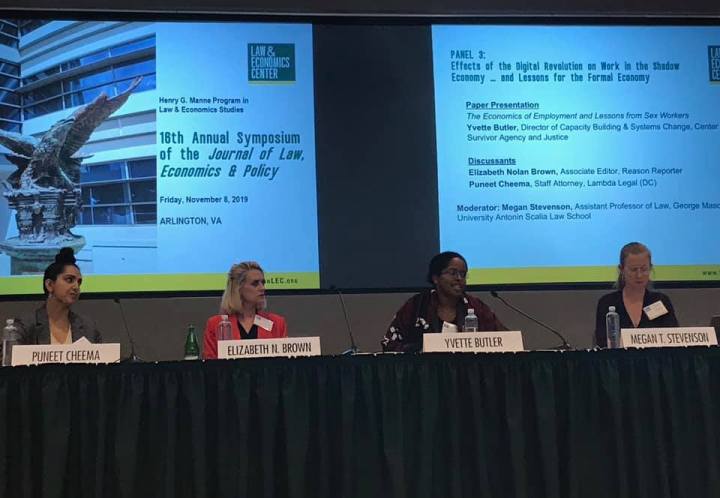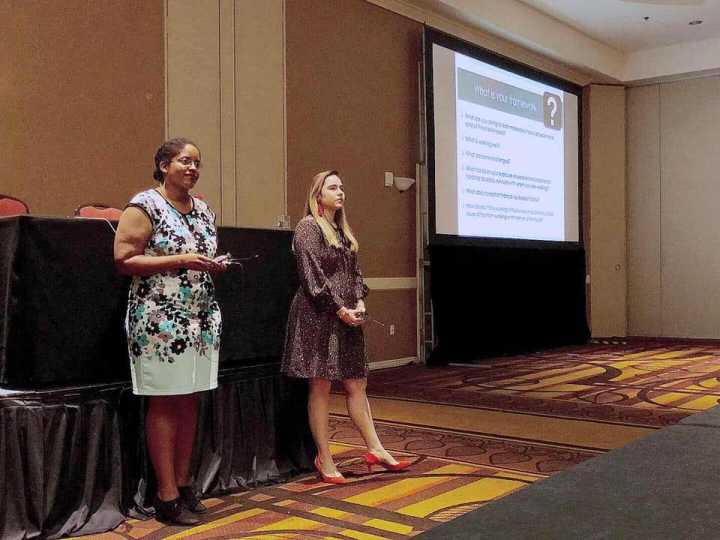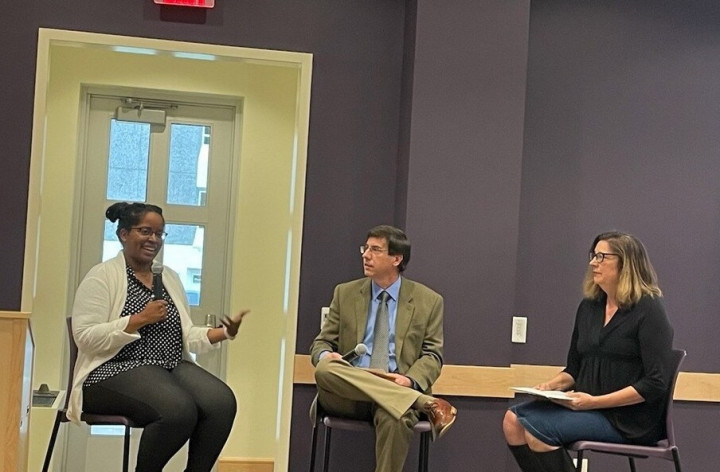Yvette Butler
Professor. Lawyer. Advocate. Advisor.
Yvette Butler is an Associate Professor at Indiana Maurer School of Law. Her scholarship examines how the law, particularly the U.S. Constitution, protects or hinders the survival and resistance strategies of marginalized groups. Her research was inspired by and remains grounded in present day advocacy efforts, particularly those involving sex workers. Her articles, essays, and book chapters have been published in or are forthcoming in top publications, including the California Law Review, Michigan Law Review, UCLA Law Review, Routledge, and Porn Studies.
Before joining academia, Professor Butler engaged in state and federal civil litigation related to police misconduct, family law, criminal record expungement, and more. Her previous experiences include federal civil rights litigation, advocating for policy change alongside sex workers and survivors of trafficking; and finally, directing national training and advocacy efforts related to domestic/sexual violence and economic security.

Scholarship
Symposium on Expertise. Panel: Family, Gender, Law. November 15, 2024. Boston University School of Law. (Invited panelist.)
Work Law Junior Scholars Workshop. November 8-9, 2024. Cornell Law School. Is Economic Liberty for Everyone?(Competitive selection process).
Richard J. Childress Memorial Lecture: The Future of Constitutional Interpretation. October 25, 2024. Saint Louis University Law School. (Invited)
Fifth Annual Boston College Junior Faculty Roundtable. March 15, 2024. Boston College Law School. Is Economic Liberty for Everyone?
Equality Law Scholars’ Forum, Nov. 10, 2023. Boston University Law School. (Invited)
6th Annual Chicagoland Junior Scholars Conference, October 6, 2023. The Constitutional Underpinnings of Survival Labor.
AALS Jurisprudence Junior Scholars Workshop, August 5, 2023. In Pursuit of Collective Liberation in Feminist Constitutionalism.
9th Annual Applied Legal Storytelling Conference, July 26-29, 2023. Knowledge, Narrative,
and Liberatory Interventions to Embedded Carceral Stories.
Decarceration Law Professors, Works-in-Progress Workshop, July 6, 2023.
Marquette University Law School, Junior Faculty Works-in-Progress Workshop, Sept. 8-10, 2022. Survival Labor. (Invited)
Saint Louis University School of Law Faculty Workshop, April 6, 2022. (Invited)
Texas A&M University School of Law, SEC Exchange Series, March 30, 2022 (Invited)
AALS 2022 Annual Meeting, New Voices in Criminal Justice, January 8, 2022. Presented WIP on “Survival Labor” (developing title for Protecting the Hustle/Navigating the Harm WIPS).
Third Annual Equity Scholars’ Forum, Boston University School of Law, November 2021. Selected to workshop WIP Navigating the Harm Caused by the Hustle.
Constitutional Law Colloquium, Loyola Chicago, November 7, 2020. Accepted to present on my work in progress Protecting the Hustle: Exploring Constitutional Protections Afforded to Survival.
16th Annual Symposium of the Journal of Law, Economics & Policy: The Changing Nature of Work and the Economics of Employment in the 21st Century. George Mason University Antonin Scalia Law School. November 2019.

Public Training
Symposium on Policing Commercial Sex Work. April 4, 2025. William S. Boyd School of Law, University of Las Vegas. (Invited speaker)
Webinar: How to become a Law Professor. April 4, 2024. Association of American Law Schools. (Invited Panelist)
What is Critical Race Theory? October 22, 2023. Bloomington Chapter of the NAACP (invited)
Fair Budget Coalition Constituent Education. January 13, 2018.
Engaged with DC Community members about the coalition’s community safety issue group priorities. We sought feedback from people who would be personally impacted and/or live in the district, to inform selection of policy priorities.
Virginia Rights and Remedies for Survivors Training. Ayuda. June 27, 2018.
Trained Ayuda’s Fairfax, Virginia attorneys and advocates on expungement, vacatur, pardons, civil protection orders, and name changes in Virginia for victims of sex trafficking.
NOVAHTI Social Worker Training. November 1, 2018.
Invited to design a training for social workers working with survivors of trafficking to highlight the differences in professional responsibility between attorneys and social workers and the many ways that social workers can help guide and support clients through the legal process.
Together We Bake. June 14, 2017.
Invited to give a training on identifying victims of sex trafficking and providing trauma informed care to the leaders of a job training program for women moving toward self-sufficiency, many of whom were previously incarcerated.
D.C. Judicial Bar Conference. April 7, 2017.
Selected to participate on a panel at the DC Judicial Bar Conference during a session with approximately 20 participants on identifying survivors of trafficking and advocating or deciding cases in a trauma-informed way.
Crowell & Moring LLP. January 7, 2017
Training on legal remedies and trauma informed care for pro-bono attorneys interested in assisting survivors of trafficking.

Educational Talks
Intersections with Reproductive Justice. October 21, 2024. If/When/How Student Chapter. Indiana University, Maurer School of Law. (Invited)
Critical Perspectives Salon III: Critical Race Theory. October 4, 2024. Boston College Law School. (Invited speaker)
Innocent Behind Bars: A Symposium on Overcriminalization, ASU Sandra Day O’Connor College of Law, the Academy for Justice, and the Law Journal for Social Justice, February 24, 2023. Roundtable Discussion 1- The Criminal Legal System and Justice: For Survivors of Violence and Survivors of a Violent Prison System. (Invited)
Mississippi State University, Department of Gender Studies Women’s History Month Series, March 31, 2023. Demonizing Our Sisters through the ‘Pimp Lobby:’ Rethinking the Law and Sex Work. (Invited)
National Association of Appellate Court Attorneys, July 8, 2022. Understanding Critical Race Theory CLE Session at Berkeley School of Law. (Invited)
United States District Court for the Northern District of Mississippi, May 23, 2022. An Introduction to Critical Race Theory. (Invited)
James Madison University, Democracy in Peril Speaker Series, April 26, 2022. Understanding Critical Race Theory: Does the Current Climate Prove the Point? (Invited)
The Effect of SESTA/FOSTA. February 2019.
Invited to speak at a hill briefing hosted by the LGBT Caucus on the effect on sex workers and survivors of trafficking after SESTA/FOSTA was signed into law.
FOSTA/SESTA Overview. DC National Lawyers’ Guild. June 28, 2018.
Provided an overview of recently passed legislation impacting individuals engaged in commercial sex and the consequences of the legislation (pro and con).
Sex Worker and Advocate Surveillance Panel. American University. September 8, 2018.
Invited to speak on a panel regarding issues of advocate surveillance by the government and how expanded surveillance affects sex worker advocacy.
